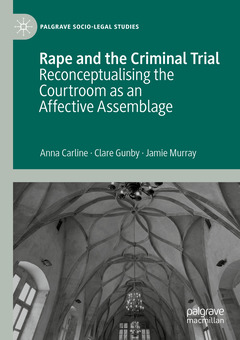Description
Rape and the Criminal Trial, 1st ed. 2020
Reconceptualising the Courtroom as an Affective Assemblage
Palgrave Socio-Legal Studies Series
Language: English
Subjects for Rape and the Criminal Trial:
Rape and the Criminal Trial
Publication date: 03-2021
Support: Print on demand
Publication date: 03-2021
Support: Print on demand
Rape and the Criminal Trial
Publication date: 03-2020
147 p. · 14.8x21 cm · Hardback
Publication date: 03-2020
147 p. · 14.8x21 cm · Hardback
Description
/li>Contents
/li>Biography
/li>Comment
/li>
This book explores the shortcomings of the criminal justice system?s response to sexual violence. Despite a plethora of legal and policy reforms, concerns remain regarding the conviction rates for rape and the extent to which cases fall out of the system. Ample research has highlighted the ongoing impact of ?rape myths? and the presence of an ?implementation gap? whereby policies, provisions and measures ? proposed in order to improve the system?s response ? are frequently not brought into practice, nor utilised as expected. Rape and the Criminal Trial proposes a move beyond representational theory and towards New Materialism and affects, a school of thought which emphasises the importance of embodiment and the ontological intensive regime as necessary in order to generate radical new approaches for understanding this problematic status quo, and in order to move forward to the production of more effective solutions.
Chapter 1 – Introduction
1.1 Reconceptualising the Courtroom
1.2 Engaging with the Book: Affective and Non-Representational Approaches
1.3 New Materialism and Affect Theory
1.4 Empirical and Theoretical Methodologies
1.4.1 Methodology one: Exploring Affects through Interviews with Barristers
1.4.2 Methodology Two: Problem Space, Problematics and Phase Space1.5 Setting the Scene: Criminal Justice Reponses to Rape
1.5.1 Substantive Law: Sexual Offences Act 2003
1.5.2 ‘Mistake Assumptions’ Judicial Directions
1.5.3 Special Measures
1.6 Conclusion
1.7 References
Chapter 2 – Mapping the Theory and the Conviction Rate Attractor
2.1 Introduction
2.2 Mapping the Theory
2.2.1 Two Ontologies: The Intensive and the Actual
2.2.2 The Intensive Incorporeals
2.2.3 A New Understanding of Sense
2.2.4 The Plane of Composition
2.2.5 Complex Systems and Assemblages
2.2.6 Self-Organisation and Emergence
2.2.7 Phase-Space or High Dimensional Manifolds
2.2.8 Deleuze and Guattari’s Affective Assemblage Theory
2.2.9 Conceptualising the Courtroom as an Affective Assemblage
2.3 Conviction Rates: A Primary Attractor2.4 Conclusion
2.5 References
Chapter 3 – Courtroom Expressions: The Intermingling of the Semiotic and Material Regimes
3.1 Introduction
3.2 The Legal Semiotic Regime
3.2.1 Consent Definition: s.74
3.2.2 Mens Rea: Reasonable Belief in Consent
3.2.3 Evidential and Conclusive Presumptions: s.75 and s.76
3.2.4 Legislation and Conviction Rates
3.3 The Affectual Force of the ‘Mistaken Assumptions’ Directions
3.3.1 Defence Counsel, Myths and Reterritorialization
3.4 Intensive Sense: Policies, Practice and Experience
3.5 Conclusion
3.6 References
Chapter 4 – Courtroom Performances: Drama, but not Representational Drama
4.1 Introduction
4.2 Courtroom Tactics, Techniques and Territories
4.3 Embodied Courtroom Performances4.4 Marshalling Affects: Performing Victimhood
4.5 Changing Cross-Examination Techniques?
4.6 Compelling Performances: Lines of Flight
4.7 Conclusion
4.8 References
Chapter 5 - Deleuze’s Materialist Philosophy of Affect and Sense
5.1 Introduction
5.2 Deleuze’s Materialist Philosophy of the Social Field
5.3 Deleuze’s Materialism: The Actual and Intensive; Corporeals and Incorporeals
5.4 Exploring the Intensive Register Further
5.4.1 Understanding the Intensive Movement of Matter and Becomings
5.5 Exploring the Intensive Incorporeals 5.5.1 Intensive Sensation and Percept
5.5.2 Intensive Bodies
5.5.3 Affect-Events
5.5.4 Affective Atmospheres
5.6 The Logic of Sense: Affect and Events in Language
5.7 Intensive Field as a Problem Field
5.8 Planes of Composition and Organisation
5.8.1 Plane-ing
5.9 Conclusion
5.10 References
Chapter 6 - Complexity Theory, Deleuze and Guattari’s Affective Assemblage Theory and the Courtroom as Affective Assemblage
6.1 Introduction
6.2 Complexity Science and Complex Systems
6.2.1 Discovering the Incorporeals
6.2.2 Complexity Science
6.3 Complexity Theory and Complex Social Systems
6.4 Deleuze and Guattari’s Affective Assemblage Theory
6.4.1 Social Assemblages
6.4.2 Semiotic and Material Regimes
6.4.3 Territorialisation, Deterritorialisation and Reterritorialisation
6.4.4 Transversal Consistencies of Social Assemblages
6.4.5 Social Assemblages and Social Regimes
6.4.6 The Field of Affective Social Assemblages
6.5 Conclusion: The Courtroom as an Affective Assemblage
6.7 References
Chapter 7 – Conclusion: Techniques of Affect and Adaptive Management
7.1 Techniques of Affect: Participating in the Intensive
7.1.1 Techniques of Affect as Artistic, Political and Ethical Practices
7.2 Adaptive Management: Managing and Regulating Complex Systems
7.2 References
Anna Carline is Associate Professor in Law at the University of Leicester, UK.
Clare Gunby is Lecturer in Criminology at the University of Leicester, UK.
Jamie Murray is Senior Law Lecturer at Liverpool Hope University, UK.
Adopts a theoretical approach to exploring legal responses to sexual violence against women
Applies New Materialism to explore a specific aspect of the legal system’s response: the use of special measures in the court room
Provides insights for policy-makers and practitioners
© 2024 LAVOISIER S.A.S.
These books may interest you

Rape JusticeBeyond the Criminal Law 137.14 €



